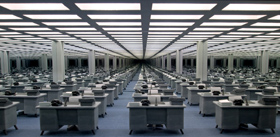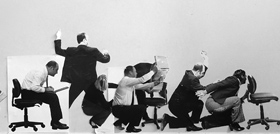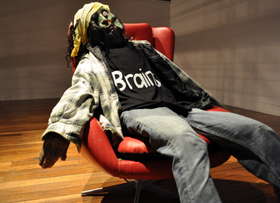Mostly Agree
Exhibition: 20 June to 21 July, 2012

© Jaki Middleton & David Lawrey. *Jaki Middleton & David Lawrey are represented by Gallery 9, Sydney
Lachlan Anthony
Penelope Cain
Carla Cescon & Martyn Ives
Jaki Middleton & David Lawrey
Louis Porter
David M Thomas
Emma White
Mostly Agree takes an outside-the-box look at identity within the corporate world. The selected artists use photomedia, video and sculptural forms to explore with humour and sensitivity the pressures of fitting in to an environment where corporate identity is paramount and there is no I in team. In this GFC-aftermath era, the balance between asserting one’s individuality and toeing the line feels all the more precarious, and by re-imagining and re-working the formulaic aesthetics of office décor, business attire, personal grooming, and by-the-book modes of behaviour, these artists explore the workplace as a site for the complex negotiation of all things generic.
Epitomizing the repetitive boredom of office life, Emma White’s stop-frame animation of a polymer photocopy machine, Reproduction, continuously spits out blank paper, back and forth, without any apparent purpose. The work’s two-fold looping – it is a reproduction of a tool for reproduction that is failing to reproduce anything – is quite ridiculous, which is conversely what makes it alluring and amusing. Conjuring a dulling of original thought with its endless repetition and uninspiring muted tones, serves to poke fun at its easily enamored audience by alerting us to the propensity with which our minds can slow to a crawl, hypnotized by non-thinking.
That humans are well programmed to be but small cogs in a big machine, is alluded to in
Jaki Middleton & David Lawrey’s
Consolidated Life, which uses the smoke and mirrors of old school
optical illusion to create a seemingly endless corporate office, a scene which
has reappeared in films
throughout the last century. This infinite
mundanity, a visual oxymoron, is interrupted only by the revolutions of a
single, ghostly chair and an eerie interpretation of background
‘musak’ that implies impending doom.
Doomsday in fact erupts in Penelope Cain’s wall-sized battle scene of warrior workers, as if the absence of people in Consolidated Life is due to the epic revolution taking place down the corridor; the spinning chair evidence of a life or death departure. Referencing the grand friezes of Ancient Greek and Roman cultures, Cain’s layering of paste-ups and digital prints allude to the reliefs that saw battle scenes emerge from stone facades. Except in this mythical siege soldiers ride bravely on chair-back, laptops shield from attack, and paper missiles are fiercely propelled beyond the sanctuary of the office plant into unknown enemy territory.
This reactivation of the past as a way to more clearly understand the present arises elsewhere in the show. In The Anatomy of Business Louis Porter mines business archives from the 80s, comingling the dated representations of corporate identity with his own photographic interventions into the modern-day business world to create a similitude between past and present. This suspended nostalgia is mirrored in his screen-printed corporate headshots that float within transparent cases like precious artifacts. Elevated from insignificance to grandeur these businessmen’s careful coiffures and perfect partings (hair allowing) are absurdly bestowed with some great, though as yet undisclosed, sociological insight into human nature.
David M Thomas’ I am Quite Sure I do not Understand the Question also explores this desire to better understand human behavior within the context of corporate agendas. Performing as two characters in a split screen, split personality video work, Thomas’ funny yet insolent clown is interviewed by his businessman alter ego, with the Values, Attitudes and Lifestyles questionnaire that was first developed in the 70s to predict consumer behavior. This psychographic survey also evokes staff evaluations that now emerge from human resources departments, as the reach of corporate power expands into the inner world of employees’ thoughts and emotions. By juxtaposing opposing personas, one symbolising conformity and composure, the other difference and deviation, Thomas asks us to consider how limitation and oppression function in the guise of choice - do you Mostly Agree, Agree, Disagree, Mostly Disagree?
Indicating that our humanness, our flaws and quirks, are not always conducive to the neat and orderly, Lachlan Anthony’s eccentric manipulations of office furniture characterise the creative resilience of individuality. Both in Mono-trip, an office chair-come-unicycle, and in the towering heights of Air, which takes ergonomics to extremes, Anthony explores the articulation of difference through a refusal to comply, at least not fully, without modification and adaptation. But the playful nature of this circus-style apparatus also symbolizes the sometimes ludicrous lengths we go to when performing for a captivated audience, albeit one that judges in terms of KPIs and Powerpoint hierarchy pyramids.
Carla Cescon & Martyn Ive’s transformation of Stills’ mezzanine suggests that a life sacrificed to the daily grind is precisely what makes a fool. The job interview/before or after is an installation akin to a stark office environment housing a suited woman who is slumped over in a chair. This pathetic image of submission, heart-wrenching despair, or simple exhaustion, arouses an uncomfortably superior feeling, which is intensified by a flashing television monitor that intermittently labels the woman an ARSE. Funny and sobering in equal measures, Cescon & Ives don’t stop short at asking whether we work to live or live to work, but are we alive at all?
Whether or not we work within suits, ties and partitions, this exhibition seeks to remind us that our daily lives are a constant negotiation of power. The corporate world provides a broader metaphor for the social pressure to conform, to comply with codes of dress and protocols of behavior, to rise the ladder of success or risk the humiliation of mediocrity. However, it is the very variety, quirkiness and humour evident in Mostly Agree’s playful perversions of corporate structures, that demonstrates how enriching resistance can be.
Emma White is represented by Breenspace, Sydney. Jaki Middleton & David Lawrey are represented by Gallery 9, Sydney.






